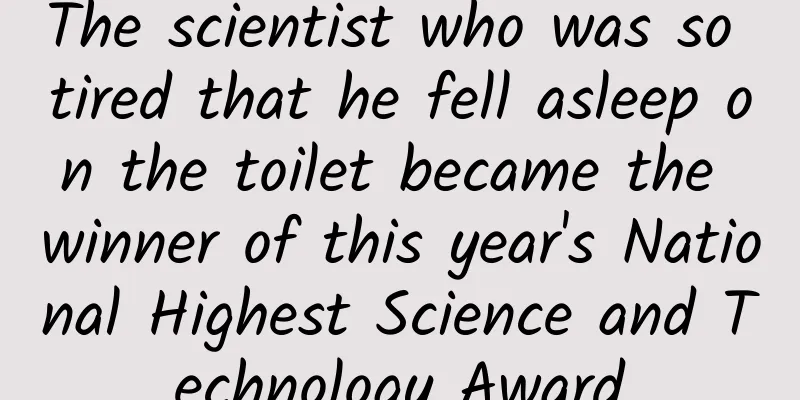The scientist who was so tired that he fell asleep on the toilet became the winner of this year's National Highest Science and Technology Award

|
▲Xue Qikun milestone The first time I met Academician Xue Qikun was in early 2019. The project "Experimental Discovery of Quantum Anomalous Hall Effect" completed by his team won the only first prize in the National Natural Science Awards in 2018. Nobel Prize winner Mr. Yang Zhenning even commented: "This is the first time that a Nobel Prize-level physics result has been made in a Chinese laboratory." On that occasion, the National Science and Technology Awards Office organized a scientific and technological media interview, and the reporters surrounded the corridor of the Physics Building of Tsinghua University. Xue Qikun led the team members and greeted everyone with a smile. He is not tall, but full of energy. When he smiles, his eyes narrow into slits. When he speaks, his Shandong Linyi accent makes people feel particularly friendly, just like a "neighbor uncle". Without any complicated routines or pomp, Xue Qikun directly invited the reporters into his laboratory and introduced the experimental situation to everyone on the front line. Walking into the laboratory of Xue Qikun's team is like walking into a science fiction world, with various complex pipelines connecting the equipment of the stainless steel cavity wrapped in silver-white tin foil. These are the "treasures" for searching for the quantum anomalous Hall effect. In the physics community, the Hall effect has been the direction of continuous breakthroughs for scientists for nearly a hundred years. It is also the hottest topic in the field of condensed matter physics and the field with the largest number of practitioners. In the past few decades, three teams have won the Nobel Prize in Physics for their scientific breakthroughs in the Hall effect. Its research progress is related to the development of electronic devices and the Internet. In the 1980s, physicists discovered the amazing quantum Hall effect. Xue Qikun used a very down-to-earth metaphor: electrons in a normal state are chaotic, they move disorderly and collide constantly. However, the electrons in the quantum Hall effect seem to be on a "highway" with a barrier in the middle, separating the "traffic" in two directions. This means that the quantum Hall effect can solve the problem of heat generation by electron collisions, and has great application potential in quantum computing and quantum information storage. The new generation of electronic chips designed based on this effect will have extremely low energy consumption. However, to put it into practical use, it has a problem that cannot be solved - it requires an external magnetic field. This magnetic field is not only expensive, but also bulky. The quantum anomalous Hall effect is different from the quantum Hall effect. It does not rely on a strong magnetic field but is generated by the spontaneous magnetization of the material itself. Therefore, it is much more convenient to apply than the previously discovered quantum Hall effect. If this discovery is put into practical use, it will greatly reduce the energy consumption of transistor operation, increase the operating speed of mobile phones and computers, increase storage space, and solve the problem of heating of electronic equipment. Even the giant supercomputer that currently occupies the size of a building will be able to become as portable as a tablet computer. This is a groundbreaking discovery. Therefore, since the 1990s, theoretical physicists have been proposing various solutions, and the world's top research groups have all wanted to solve this problem. However, no progress has been made in experiments. In 2008, Chinese-American physicist Shoucheng Zhang proposed the direction of experimenting with quantum anomalous Hall effect in magnetic topological insulators. However, finding suitable materials is full of huge challenges. No one knows whether or when the quantum anomalous Hall effect can be observed in such materials. This is a project that may not be completed in one's lifetime. Xue Qikun has been focusing on physics research since he graduated with a doctorate, and condensed matter physics and materials science have always been his "main line of work." Since 2009, Xue Qikun has led his team to study topological insulators, determined to verify the hypothesis through experiments and to impact the experimental realization of the quantum anomalous Hall effect. Since you have chosen the distant place, you should just keep going regardless of the wind and rain. Facing the "Mount Everest" of the physics world, Xue Qikun did not flinch at all, and chose to move forward courageously. In his opinion, on the road of science, sometimes you have to break the routine, break through habitual thinking, and find another way to see a different scenery. The samples used by Xue Qikun's team for the experiment were laid out layer by layer with atoms, only a few nanometers thick, equivalent to one hundred thousandth of a hair, and it is extremely difficult to prepare each one. This is a job that requires careful observation, and any clues in the experiment may change the final result. In four years, they prepared more than 1,000 samples and experienced countless failures. After each failure, Xue Qikun led the team to improve samples and innovate methods. Facing the frustration of team members, he always encouraged everyone, "Failure enriches our cognition and provides us with a lot of new information. It is also a valuable experience." It was not until 10:30 p.m. on October 12, 2012 that Xue Qikun received a text message from his student: "Teacher Xue, the quantum anomalous Hall effect has been discovered, waiting for detailed measurements." He recalled that he suppressed his inner pounding and immediately called to confirm the situation. He then quickly returned to the laboratory, immediately organized team members, designed several plans, and deployed the next experiment. After two months of intensive testing and continuous research, Xue Qikun's team finally tested perfect experimental data, overcoming a world problem that had existed for more than 130 years, and was evaluated by the reviewers of Science magazine as "a milestone in the field of condensed matter physics." ▲Xue Qikun (first from left) exchanges views with a delegation from the Department of Physics at the University of Pennsylvania Do it to the extreme Xue Qikun's perseverance, tenacity and pursuit of excellence are the result of the hardships he experienced during his youth. He was born in a small village in the Yimeng Mountains of Shandong Province in December 1963. The hardships of life made him the main farm worker at a young age. Growing up in this environment, while struggling with poverty, hunger and backward living conditions, he was more eager to use knowledge to change his own destiny and open a door to the outside of the mountain village. The lack of material conditions did not stop Xue Qikun's ambition to become a great scientist. At the age of 17, his efforts were rewarded - he officially became a freshman in the Department of Optics at Shandong University, starting a new journey. After graduating from university, Xue Qikun was assigned to Qufu Normal University as a physics teacher, which was an enviable "iron rice bowl" at the time. But he was not satisfied with the plain but stable real life in front of him. He did not forget his dream of becoming a scientist when he was a teenager. To become a scientist, it is necessary to continue to study and conduct more in-depth study and practice. Xue Qikun tried to take the postgraduate entrance examination twice. The first time he got 39 points in advanced mathematics, and the second time he got 39 points in physics. The two failures were a huge blow to him. However, when he was preparing for the third exam under pressure from all sides, he finally passed the exam and entered the Institute of Physics, University of Chinese Academy of Sciences to study condensed matter physics. The experience of taking the postgraduate entrance examination three times made Xue Qikun reflect more deeply. He realized that he was not extremely smart, and his success at certain stages was more due to his hard work and his tenacity to resist setbacks. "Whether it is studying or doing scientific research, it requires long-term solid work and doing the best in every step. Doing research is like being a person. You must not cheat or compromise, and you must take every path down to earth." Xue Qikun understood this truth very early. During his doctoral studies, Xue Qikun was given a joint Sino-Japanese training opportunity at the Institute of Metal Materials of Tohoku University in Japan, recommended by his supervisor Lu Hua. This is the oldest university-affiliated research institute in Japan, and is also a place that students studying physics yearn for. But as soon as the plane landed, difficulties came. The biggest problem was the language barrier. Xue Qikun did not speak Japanese, and he was completely unable to keep up with the pace when he first arrived. He could not understand the instructions of his supervisor in the laboratory. When others were doing experiments, he could only stare blankly, always a step slower than others, and was often criticized by his supervisor for this. The mentor, Toshio Sakurai, was famous for his rigor and strictness. His laboratory was known as the "7-11 laboratory" because Toshio Sakurai required his team members to work 6 days a week, come to the laboratory at 7 am, and not leave before 11 pm. When Xue Qikun first arrived in Japan, he did three things every day: eating, sleeping, and doing scientific research. Sometimes he was so sleepy that he fell asleep while sitting on the toilet. Once, Xue Qikun was asked by his supervisor to spend three days to neatly arrange tens of thousands of screws according to categories. At first, Xue Qikun found it difficult to accept and felt that "this was an insult to me", but after calming down, he realized that this was precisely the supervisor's way of tempering his attitude of pursuing perfection - which is the attitude most needed in science. From then on, Xue Qikun was the first to arrive at the laboratory every day and the last to leave. Gradually, he could understand what his instructor said and operate the experimental instruments. Experiments seem to be simple repetitions, but in fact every step is changing, with unexpected events, surprises and gains. "Only with a lot of learning, accumulation and practice can you have a better scientific intuition." This seemingly stupid method of "building a stronghold and fighting a stupid battle" made Xue Qikun one of the most improved and fastest growing students in the team without realizing it. He eventually published a paper in the world's top academic journals, and his scientific research results became the most groundbreaking scientific research results of Sakurai Toshifu's laboratory in the past 30 years. Although he was abroad, Xue Qikun always paid attention to the development of the field of physics in China and wanted to bring the advanced knowledge he learned in Japan back to China. In 1999, he was selected for the "Hundred Talents Program" of the Chinese Academy of Sciences. After working in the "7-11 Laboratory" for 8 years, he resolutely gave up the favorable conditions in Japan and returned to China, where he was hired as the director of the State Key Laboratory of Surface Physics of the Chinese Academy of Sciences. In 2005, Xue Qikun joined the Department of Physics of Tsinghua University and became the youngest among the group of people selected as academicians of the Chinese Academy of Sciences in the same year. After achieving success, Xue Qikun still sticks to the schedule he had in Japan, and it has been more than 20 years now. His academic requirements for students are as strict as those of his Japanese mentors, starting with solid basic training. "When writing reports, I will also pick out a punctuation error; when operating an instrument, whether it is clockwise or counterclockwise, you must be able to operate it correctly with your eyes closed." Xue Qikun smiled. The purpose of "finding faults" is naturally not to punish, "that is because research on scientific problems cannot be sloppy. Only by being extremely rigorous in daily life can you cultivate an excellent scientific research style." ▲Xue Qikun is teaching Working hard is like digging a well In the face of global competition, whoever has more and better talents will be able to take the initiative in the competition and win the future. This is true for the industry and the country. Xue Qikun has always regarded talent cultivation as an important task for the long-term development of science. In November 2020, he became the president of Southern University of Science and Technology (hereinafter referred to as "SUSTech"), completing the role transition from a scientist to the head of a university. As a new public research university with a high starting point and high positioning established in the context of China's higher education reform and development era, SUSTech is known as the "experimental field of China's higher education reform". Xue Qikun has been working tirelessly to launch a series of reform measures, adjusting the scientific research model and talent training model; proposing the "SUSTech 2035 Question"; creating SUSTech's "three major development strategies"; creating a "major + general education", "college + department", "science and education + industry and education" training mechanism, and so on. As an innovative university with a strong focus on science and engineering, the Southern University of Science and Technology led by Xue Qikun has made every effort to encourage innovation from 0 to 1. He said that doing basic research is equivalent to laying the foundation, which is not glamorous or bright, but it carries the stability and uprightness of the entire building. The biggest feature of basic research is uncertainty. A breakthrough requires long-term investment, and even "no one knows when it will be realized." Therefore, Xue Qikun specifically proposed that scientific research cannot be simply evaluated based on results, and evaluation cannot be turned into a vulgar "ruler" and measured by quantity like counting products. In order to further improve the evaluation mechanism, cultivate a good scientific research atmosphere, and allow young people to concentrate on basic scientific research and carry out long-term scientific research exploration, South China University of Technology has adopted a relatively flexible long-term and quasi-employment system to match young teachers with independent laboratories, as well as the same graduate resources and scientific research funds as other experienced teachers, providing them with a stage to carry out independent scientific research, thus attracting many outstanding young scholars. Zeng Guofan once said: "Working hard is like digging a well. Rather than digging several wells and none of them reach the spring, why not stick to one well and strive to reach the spring, and use it inexhaustibly!" Xue Qikun also regarded scientific research as digging a well to get water. After digging the soft soil on the surface, there may be hard rock layers underneath. This is the critical moment to test people. You must learn how to use various tools and methods and keep digging, only then can sweet spring water gush out. Don't change the location when you encounter difficulties. The result can only be day after day, year after year. Even if you dig all over the hill, in the end you can only envy the spring on the hill, without water to drink, and it is difficult to succeed. Xue Qikun is such a courageous and resolute well digger who never gives up easily. In his view, all kinds of "ups and downs" are also an indispensable experience in life. As long as you are determined to do something, stick to one path, and make progress every day, you will definitely accumulate greater results and eventually reach your goal. "Scientific discoveries can be accidental, but behind the accident are countless inevitable efforts. I hope more young people can enjoy the interest of scientific research and engage in challenging scientific research." Xue Qikun is full of expectations for the younger generation. In an interview program on CCTV, he expressed his longing: "If each of our more than one billion people is working very hard to pursue perfection, then the great rejuvenation of the Chinese nation will not be far away?" |
<<: Scientists have made the "purest silicon in the world". Are quantum computers really coming?
Recommend
23 operational promotion routines to obtain traffic for free!
What is the biggest headache for companies when d...
Case review | Difference in daily activity? Is it difficult to promote vitality? Learn user operations from Onmyoji
Onmyoji is a phenomenal mobile game with over 10 ...
Vivian 28-day sales training camp, how much does Vivian sales course cost?
Throughout my career, I have been involved in sal...
How much does it cost for a Leshan merchant to customize a tableware mini program?
There is no fixed price for the customization of ...
Is quitting smoking suddenly harmful to your health? Is vaping healthy? 7 common rumors about smoking that have harmed many people
It has become a consensus that smoking is harmful...
Where is the source of the 2022 epidemic? In which town is it located? Attached is the latest news on the epidemic
Recently, according to the new local confirmed ca...
2019 Pinduoduo Product Operation Analysis Report
Pinduoduo has rapidly grown into the third larges...
Apple releases iOS 15.3 RC and closes iOS 15.2 verification channel
According to the update file, this update mainly ...
Miao Sang's iPad illustration system class for beginners will end in July 2021
Miao Sang's iPad illustration system class fo...
Focusing the Mind: The Evolution of the Brain
The superior wisdom of the human brain has create...
Caimao Practice-The Fourth Period Documentation of Cat Brother System Learning Class + Leading Group
Caimao Practice - The fourth document of the Cat ...
How much does it cost to renovate a second-hand house in Lanzhou? How much does it cost per square meter to renovate an old house?
Unlike new houses, second-hand houses require mor...
Striving for youth is just about climbing! Come on, students!
2022 College Entrance Examination Today officiall...
Baidu Aicaigou bidding ranking rules
First, let’s briefly talk about the two ways of B...
Is the drain clogged with hair? Are you losing hair? Here are 3 tips to help you determine if you are losing hair.
Taking a bath is relaxing But washing your hair m...









